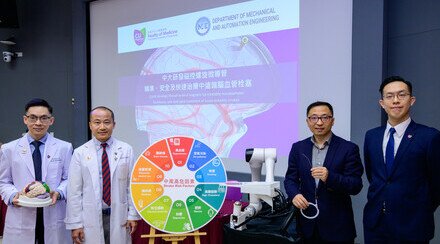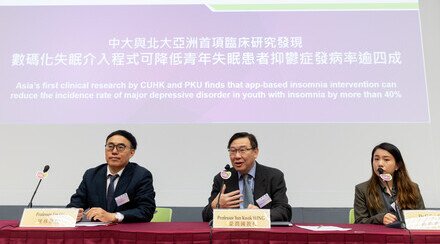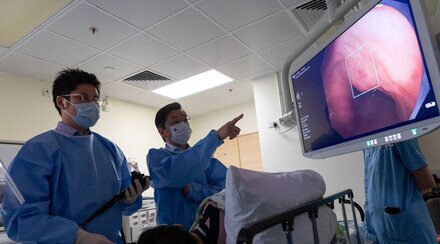CU Medicine completes world’s first study evaluating intracerebral hemorrhage treatments for Chinese patients with atrial fibrillation
The Division of Neurology at The Chinese University of Hong Kong (CUHK)’s Faculty of Medicine (CU Medicine) conducted the world’s first population-based study comparing the use of prothrombin complex concentrate (a coagulation factor concentrate) versus conservative treatment for Chinese patients with atrial fibrillation (AF) who have developed intracerebral hemorrhage. The results showed that among those patients, prothrombin complex concentrate treatment did not significantly improve recovery outcomes compared to conservative treatment, and that there is still an urgent need to explore effective treatment for intracerebral hemorrhage patients. The research findings have been published in top international medical journal JAMA Network Open.
In light of World Brain Day on July 22, the research team calls on the public, especially AF patients, to strictly manage risk factors that can lead to intracerebral hemorrhage and maintain a healthy lifestyle, as intracerebral hemorrhage associated with direct oral anticoagulants (DOACs) has extremely high morbidity and mortality.
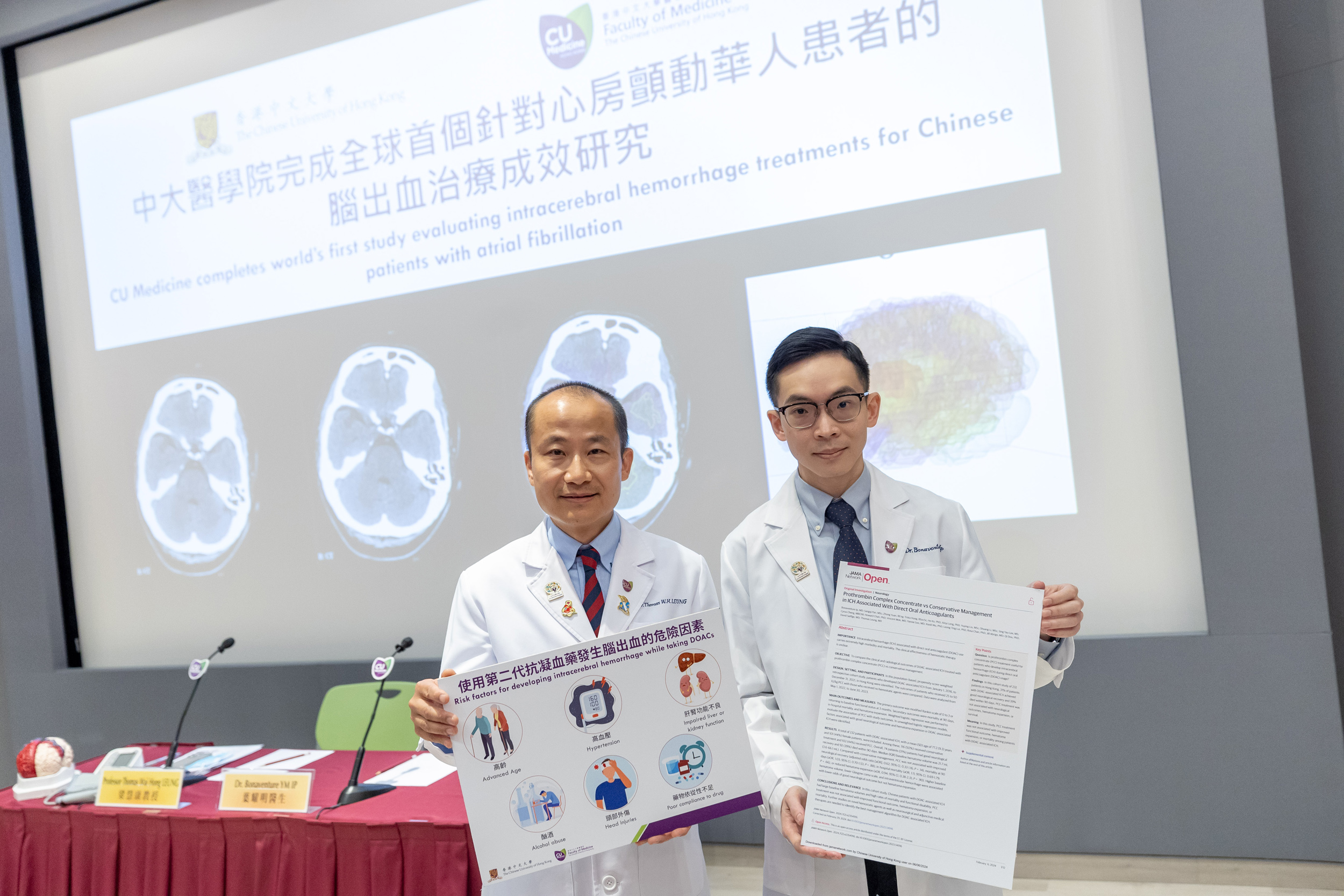
CU Medicine conducted the world’s first population-based study comparing treatments for Chinese patients with atrial fibrillation (AF) who have developed intracerebral hemorrhage. Results showed that among those patients, prothrombin complex concentrate treatment did not significantly improve recovery outcomes compared to conservative treatment, and there is still an urgent need to explore effective treatment for intracerebral hemorrhage patients. (From left) Professor Thomas Leung Wai-hong, Lee Quo Wei Professor of Neurology and Head of Division, and Dr Bonaventure Ip Yiu-ming, Assistant Professor from the Division of Neurology at CU Medicine’s Department of Medicine and Therapeutics.
One in a thousand patients have intracerebral hemorrhage while taking direct oral anticoagulants
Irregular heartbeats in AF patients affect blood circulation in the heart, which may lead to the formation of blood clots. When these blood clots are carried to the brain, they can cause occlusion of brain vessels and lead to cardioembolic stroke. DOACs can help prevent vascular thrombosis and reduce the risk of ischemic stroke by 60-70% in AF patients, but they may also increase the risk of bleeding.
The risk of intracerebral hemorrhage while taking DOACs is approximately 0.1%, making it a rare but serious complication. When a cerebral vessel ruptures, blood leaks out and forms a hematoma that compresses brain cells and affects blood supply, leading to severe disability and a high mortality rate of up to 40%. Therefore, timely and effective hemostatic treatment is crucial for intracerebral hemorrhage patients. Usually, based on the size and location of the intracerebral hemorrhage, as well as the patient’s condition, doctors will decide whether to employ conservative management with blood pressure control or use prothrombin complex concentrate to replenish coagulation factors. Yet the recommendation of prothrombin complex concentrate usage in such conditions has been based on expert opinion and animal models, with a lack of comparative studies that estimated the clinical benefit of such treatment.
Big data analysis reveals prothrombin complex concentrate treatment does not improve intracerebral hemorrhage prognosis
The research team led by Dr Bonaventure Ip Yiu-ming, Assistant Professor in the Divion of Neurology of the Department of Medicine and Therapeutics at CU Medicine, analysed clinical and imaging data from the Hospital Authority Data Collaboration Laboratory and the territory-wide DOAC Registry of 232 anonymised AF patients who developed intracerebral hemorrhage while taking DOACs between 2016 and 2021. Utilising an AI imaging analysis algorithm developed in collaboration with CUHK’s Department of Imaging and Interventional Radiology and Department of Computer Science and Engineering, the team compared the two treatment approaches and found that among all 232 patients, only 31% achieved a good neurological recovery, while 39% died within 90 days. Compared to conservative treatment, prothrombin complex concentrate treatment did not significantly improve neurological recovery, reduce mortality rate or reduce hematoma expansion.
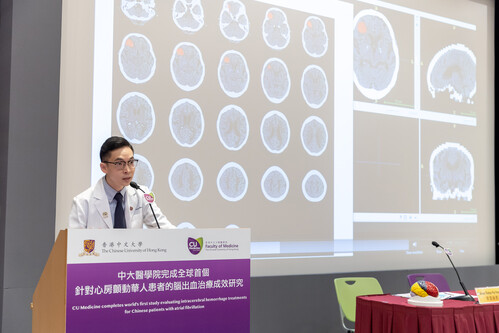
Dr Bonaventure Ip says the AI imaging analysis algorithm developed in collaboration with CUHK’s Department of Imaging and Interventional Radiology and the Department of Computer Science and Engineering can spot blood clots formed in intracerebral hemorrhage, and analyse the volume and expansion of the blood clots.
Dr Ip emphasised, “DOACs are generally highly effective and safe, with intracerebral hemorrhage during medication a rare but severe complication. Prothrombin complex concentrate is currently listed as one of the treatment options in international intracerebral hemorrhage management guidelines. Our study helps to understand the optimal treatment strategy for intracerebral hemorrhage associated with DOACs. High-quality research data now suggests that specific anticoagulant reversal agents and timely blood pressure control have significant therapeutic effects in the treatment of acute intracerebral hemorrhage.”

Professor Thomas Leung remarks ischemic stroke can be prevented. He reminds AF patients to adhere to regular follow-ups and DOACs to minimise the risk. Using electric devices with AF detection function is also an option for daily risk management. Patients should also manage their blood pressure and avoid falls or injuries to manage the risks of intracerebral hemorrhage.
Professor Thomas Leung Wai-hong, Lee Quo Wei Professor of Neurology and Head of Division of Neurology at CU Medicine’s Department of Medicine and Therapeutics, concluded, “Our findings underscore the urgency of seeking better treatment strategies for intracerebral hemorrhage patients. Ageing increases the risk of intracerebral hemorrhage, and with the ageing population and widespread use of DOACs, we anticipate an increasing incidence of intracerebral hemorrhage. AF patients should adhere to regular follow-ups and manage risk factors to minimise the risk.”
The research team reminds the public, especially AF patients, to actively manage risk factors such as hypertension, impaired liver or kidney function, alcohol abuse and head injuries that can lead to intracerebral hemorrhage, and to maintain a healthy lifestyle, while also adhering to medical instructions regarding medication. To minimise the risk of developing cardiovascular and cerebrovascular diseases, the team recommends maintaining healthy lifestyle habits, including a balanced diet, regular exercise and avoiding excessive alcohol consumption.
About World Brain Day
The World Federation of Neurology marked World Brain Day on 22 July with a call to increase public awareness and promote brain health advocacy, reducing the healthcare burden from brain disorders. This year’s theme, “Brain Health and Prevention”, aims to raise public awareness of preventing neurological disorders through early detection and effective management.



